It’s summer and it’s time for grilling! However questions doe arise- how can I create safe and healthy meals?
If you are debating on whether to grill using gas or charcoal, gas is environmentally cleaner while charcoal does release soot and carbon monoxide into the environment. Many people still prefer the taste from charcoal grill, in this case, it is so it is recommended that you use “additive-free lump charcoal” as opposed to traditional briquettes. Set the charcoal together and place tightly wrapped paper or small twigs to start the coals. Try to avoid using lighter fluid at all because the vapors escape into the environment and are also absorbed by the food. This leaves your food with traces of contaminations and decreases the taste quality.
Start by pre- heating the grill, with gas this take about ten minutes and with charcoals approximately 15-25 minutes. After the grill has been preheated, always clean the grill top using a grill brush. Grills tops are easier to clean when hot. Final preparation step is to oil the cleaned grill using a brush or thongs with cloth dipped the vegetable oil. Using oil helps to prevent your food from sticking. Avoid the use of cooking sprays, which could cause the flames to rise.
The other question that comes to mind, are there harmful health effects from grilling? The answer is yes. When the high heat from the gas or coals is exposed to the muscle of the meats, heterocyclic amines (HCAs) carcinogens form. The best way to reduce the effects of HCA is to marinate meat for one hour or more. According to the American Institute for Cancer Research (AICR), marinating can reduce HCA formation by as much as 92 to 99 percent. Select marinates that contains olive oil or citrus juices. Recently scientists at the Food Safety Consortium project at Kansas State University have discovered that herbs of the Lamiaceae family (Basil, Mint, Rosemary, Thyme, Oregano, and Sage) used in marinades reduced HCA formation dramatically. These herbal antioxidants reduce the formation of free radicals (bad stuff) when meat hits heat. Attached is a simple BBQ marinade that is beneficial in reducing HCA, low in calories and big on flavor.
Another potential carcinogen to be aware of when grilling is polycyclic aromatic hydrocarbons (PAH), which are released from the charcoal when the fat from the meat drips and creates flare up or intense heat. The effects of PAH are reduced by selecting meats that have less fat or by removing visible fats from meats to reduce dripping on to coals. Use moderator heat to avoid flare ups which tend to char the meats. Turning the meat regularly also helps reduce flare –ups and, creates less charred meat. If meat becomes charred slide it off, and do not eat the charred parts. However, always make sure that you cook meats to the appropriate internal temperature.
Healthy grilling also includes vegetables and fruit. Grilled vegetables really are healthier than those that are broiled (where they will lose some nutrient in the water) or fried which add only fat. Unlike meats, produce doesn’t contain the HCA, however you do want o turn your vegetables often to avoid the affects of charring.
For grilling, select vegetables with low water content, such as onions, cabbage, mushrooms, bell peppers and asparagus. You can either grill the vegetables directly on the grill or wrap them in a piece of foil first. If you wrap them, you won’t need to add any fats or oils. Fruits grill nicely, and the taste becomes greater because of heating the natural sugar found in fruits.
Another way to take advantage of the summer produce is to create salsas. A variety of salsas can add interest too many grilled meats. See salsa recipes attached
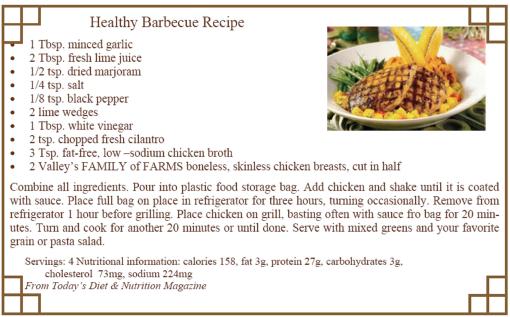
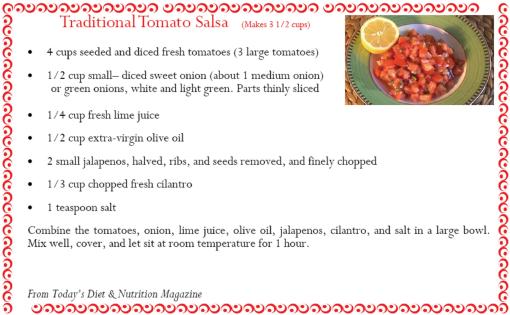
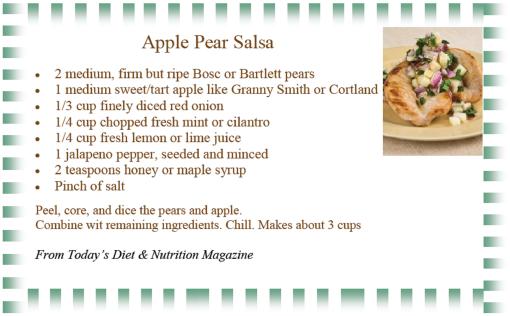
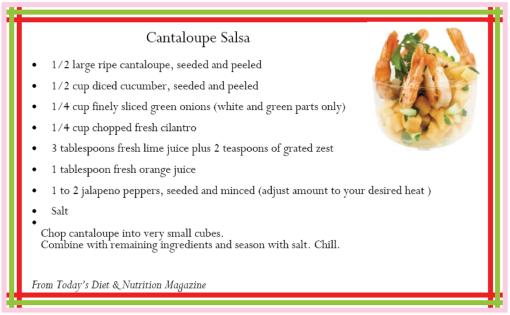
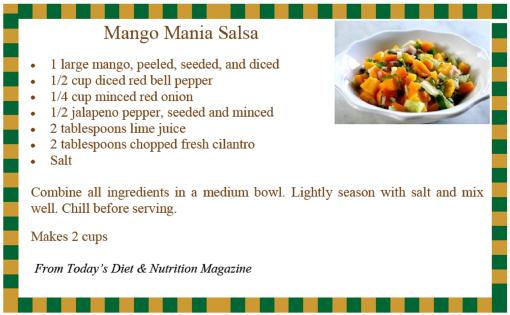
So for healthy BBQ:
1. Follow the steps of healthy grilling.
2. Be sure to provide your family or guests with plenty of grilled vegetables rather than the traditional pasta and potato salads, that often are heavy laden with calories from mayonnaise and other dressings with fat.
3. Offer fresh summer fruits in the form of salsa or offer grilled fruit for a lighter dessert.
4. After the meal, go and have fun doing some physical activity. Play ball, or go for walk.
Contributor to this blog, Tara Dorsey, Simmons Student volunteering with BPHC this summer.
August 19, 2009 at 12:27 pm
If you want a grill that allows you to grill almost anything, and also to use your charcoal to maximum efficiency, google “german grill”. It’s a very well thought-out design and the site has a lot of tips and tricks if you really want to dive into charcoal grilling.
August 29, 2009 at 3:13 pm
Ya it’s a summer time and most of us search for tempting dishes in this season. I am also one of them. Thanks for sorting out my problem…
January 13, 2010 at 8:51 pm
Glad we were helpful. Send us your healthy recipe for possible posting .
kathy
April 29, 2010 at 12:33 pm
[…] decided this year to treat ourselves by investing in a propane grill. I know there is much debate about the health effects of using charcoal or propane and people tend to land on both sides of the […]